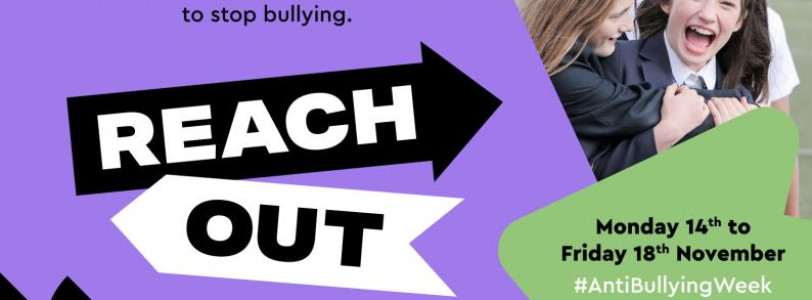Anti-bullying week is an annual event in the UK that aims to raise awareness of bullying of children and young people and highlights ways of preventing and responding to it. The week is coordinated by the Anti-Bullying Alliance and this year’s theme is Reach Out.
This Anti-Bullying Week (w/c 14th November) the NSPCC is offering:
- New data from Childline,the NSPCC’s counselling service for children.
- Quotes from young people and Shaun Friel Childline Director
- Advice for young people and parents and carers.
- Spokespeople for interview
- Real life stories for interview
Childline data
- From April 2021 to March 2022 Childline delivered 8,006 counselling sessions to children and young people about bullying.
- 6,927 of these counselling sessions were about bullying in-person, a 67% increase compared to the year before when there was the national covid lockdown.
- 1,079 counselling sessions were about online bullying.
- The top three concerns where a child spoke to Childline about in-person bullying included: insults, taunts, name-calling; bullying about differences and violence.
- For counselling sessions on online bullying, the top three concerns included: nasty comments, threats, and intimidation.
Quotes from: children who contacted Childline about bullying
A girl aged 13 who contacted Childline said: “I want to talk about being bullied. It is making me feel depressed. I feel as though no-one cares that I’m hurt, and I feel as though everyone is laughing at me. My “friends” are the ones who are bullying me. They get other people to hit me. And they threaten me, call me names, and leave me out of things. I don’t want to tell a teacher because I don’t want to be called a “snitch.”
A child aged 12 who contacted Childline said: “I’m being bullied by people I used to go to school with. They send my picture around to people I don’t know and say nasty comments. I have blocked them online but sometimes I unblock them because I want to know what they are saying. But then it just makes me sad and annoyed.”
Shaun Friel, Childline Director said:
“Bullying continues to remain a top issue that children turn to Childline about on a daily basis. Ever since we moved out of the national lockdown and children returned to school, we have continued to see a rise in the number of contacts to Childline about in-person bullying. Those who have called the service about this have spoken to our trained counsellors about experiencing name calling, being excluded and physical violence. Whilst many others have turned to the service about being bullied online. Some of those who have contacted our counsellors about this have said that they’ve been threatened online, had rumours spread about them on social media platforms and others have had been made fun of on online chatrooms. Regardless of how or where a child is bullied, we know it can have a detrimental impact if they don’t get the support they need. These children often sad, overwhelmed and lonely. This Anti Bullying Week at Childline, we want to remind all children and young people that if they are being bullied that this is not their fault and they can always reach out to Childline for immediate support. Our counsellors are here to help and can be contacted confidentially, day or night, online or on the phone.”
Advice for children
- Share how you are feeling with other young people. Childline’s online message board is a non-judgemental space where you can speak to other children who are in a similar situation to you about your experiences and feelings. This can help you feel less alone and will give you an online support network that you can turn to.
- Talk to an adult you trust about the bullying you are experiencing so you feel less alone and so that adult can support you. This could be a parent, teacher or you can speak to a Childline counsellor on 0800 1111 or online at childline.org.uk
- Take a break from your device if you are being bullied online and do something you enjoy such as sports, listening to music or art.
- Remember the bullying is not your fault.
- Report and block someone if they are sending you messages online that upset you.
For Adults
Signs to spot that your child may be being bullied online:
- Not wanting to go to school or take part in normal activities.
- Getting anxious or angry if you go near their device. Feeling withdrawn, upset or angry at home.
- Problems sleeping or eating.
- Having angry outbursts that seem out of character.
- Spending more or less time online than normal.
Signs to spot that your child may be being bullied in-person
- Belongings are getting lost or damaged.
- Physical injuries such as unexplained bruises.
- Being afraid to go to school.
- Not doing as well at school.
- Being nervous, losing confidence, or becoming distressed and withdrawn.
- Problems with eating or sleeping.
- Bullying others.
What to do if you think your child is being bullied
- Talk to your child and remind them to come to you with anything that might be making them feel anxious or sad. If your child speaks to you about an experience of bullying that they’ve had online or in person, try to remain calm and don’t overwhelm them with questions and reassure them that it will be ok and that you’re always there for them.
- Show them how to report or block a message that they’ve received from someone online that upsets or worries them.
- Don’t take their device away if they’ve had a negative experience online. Although you may want to do this if they are upset, this may make them feel like whatever has happened is their fault. Instead, suggest they take some time away from the app they received the messages on and do another online activity they enjoy like playing a game.
- Know where you can get further support. Adults can call the NSPCC helpline for advice on 0808 800 5000. There is also further advice on the NSPCC website.









0 Comments